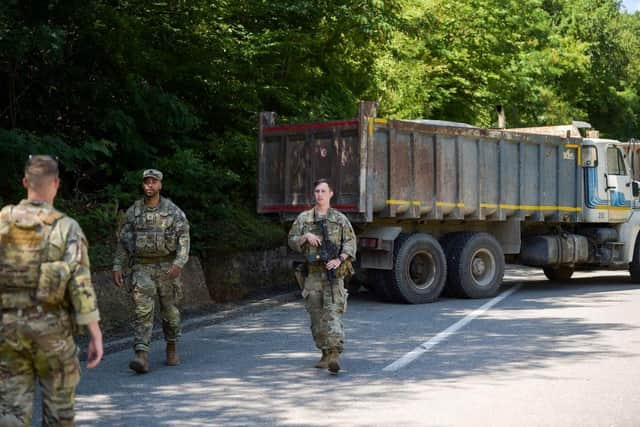Why have tensions risen between Kosovo and Serbia?
The Kosovan government had given notice that from August 1, all vehicles needed to switch to licence plates and documents issued by Kosovo, rather than Serbia. It is believed around 50,000 Serbs living in the north of the country still used Serbian plates.
However, as the date approached, many Serbs opposed to the move blockaded roads leading to two border crossings. The law has now been delayed by a month in a bid to defuse the situation.
Advertisement
Hide AdAdvertisement
Hide AdThe Nato-led peacekeeping Kosovo Force (KFOR), which has 3,770 troops on the ground in the country, warned the situation was “tense” and that it was prepared to intervene if the situation destabilised.


Although Kosovo declared independence from Serbia in 2008, a move that has been recognised by more than 100 countries, Serbia and Russia do not recognise it as such and Serbia maintains that Kosovo continues to be part of its territory.
The country, with its largely ethnic Albanian population, was placed under the United Nations protectorate from 1999, following a military crackdown by then-Yugoslavia, which resulted in the Nato bombing of Serbia.
Kosovo at the time was a province, rather than an independent nation. Ten years earlier, Serbian president Slobodan Milošević had drastically reduced Kosovo's special autonomous status within Serbia and hundreds of thousands of ethnic Albanians were displaced as a result.
The Yugoslavian wars, which were a series of conflicts in the region between 1991 and 2001, were previously described as Europe's deadliest conflicts since World War Two, with the International Center for Transitional Justice estimating a death toll of 140,000 people. The conflicts were marked by many war crimes, including genocide, crimes against humanity, ethnic cleansing and rape. Some leaders of countries involved were tried for war crimes by the International Criminal Tribunal for Yugoslavia, set up by the UN.
KFOR said: The overall security situation in the Northern municipalities of Kosovo is tense. The Nato-led KFOR mission is monitoring closely and is prepared to intervene if stability is jeopardised.”
The organisation called on both Serb and Kosovan parties to continue negotiations facilitated by the European Union, which began in 2011.
It added: “It is important that this continues. This is critical for regional peace and security. There will be no real prospects for a better future in the Balkans, without full respect for human rights and democratic values, rule of law, domestic reforms, and good neighbourly relations. Constructive dialogue is key for regional stability.”
Advertisement
Hide AdAdvertisement
Hide AdUS Ambassador Jeffrey Hovenier is understood to have asked Kosovo's government to delay the enforcement of the license plate ruling for 30 days, saying it “seems that there was misinformation and misunderstanding about the decision".
At the time of Kosovo declaring independence in 2008, Russia claimed doing so could spark a wave of smaller countries seeking independence, including Turkish Cypriots and the Basque country – as well as Scotland.
There have previously been claims the Kremlin tried to influence the 2014 Scottish independence referendum through misinformation, with the Intelligence and Security Committee report saying there was “credible” commentary suggesting Russia undertook influence campaigns around the referendum.
Comments
Want to join the conversation? Please or to comment on this article.
